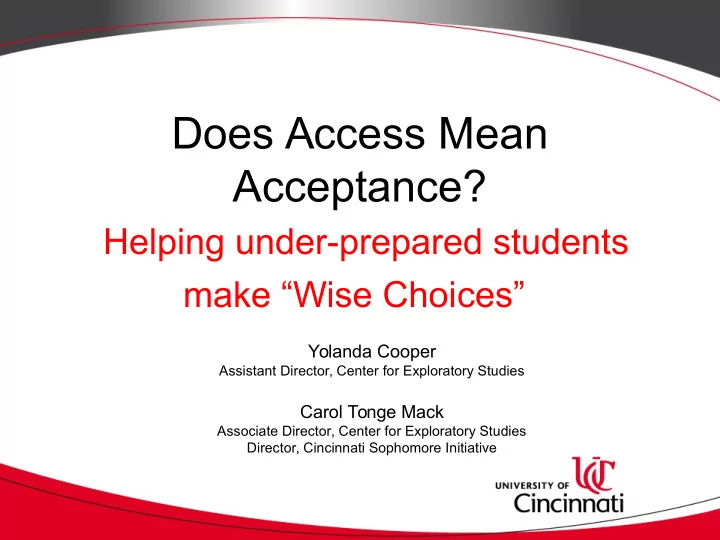

Does Access Mean Acceptance? Helping under-prepared students make “Wise Choices” Yolanda Cooper Assistant Director, Center for Exploratory Studies Carol Tonge Mack Associate Director, Center for Exploratory Studies Director, Cincinnati Sophomore Initiative
Today’s Conversation • What is Access? • UC Demographics • Center for Access and Transition (CAT) • Center for Exploratory Studies (CES) • Wise Choices Program • Student Challenges • Case Study/What’s my major?
What is Access? • Access is: – Holistic – Appropriate Connection – Opportunity • “ A set back is only a set up for a comeback” Willie Jolley • “Access without support is no real opportunity” Vincent Tinto
Rolling Stones • You can’t always get what you want, but if you try, sometimes, you just might find, you get what you need….
University of Cincinnati (UC) Demographics • Urban, Research I institution • Approx 36,518 total number of students ( include grad & professional school) – 27,700 Undergraduate Students – Twelve Colleges ( including 2 Branch campuses ) – 2% Center for Access and Transition (CAT) Office of Institutional Research, 2007 Student fact book
Center for Access and Transition (CAT) • Established in 2004 to provide academic support to undergraduate students who were NOT admitted to one of UC’s baccalaureate programs • Faculty support in English, Math, Reading, and Oral Communication • Students must complete developmental courses within one academic year • The Center has transitional agreements with five colleges: – Arts & Sciences – Allied Health Sciences – Applied Science – Education, Criminal Justice, and Human Services – Nursing
Requirements for CAT Transition • Orientation attendance – Degrees of Reading Power (DRP) – Math – English • Learning Agreement (signed document with advisor) • Meet with an advisor 3 times per quarter • Seamless transition (no additional paperwork)
GPA requirements for transition • College of Arts and Sciences (2.0) • College of Applied Sciences (2.75) • College of Nursing (2.5 but prefer a 3.0 to pre-nursing) • College of Education (2.5 Criminal Justice, 2.75 Teachers College) • College of Allied Health (2.5) *College of Business (transition to Exploratory Studies)
No Learning Agreement • College of Business • College Conservatory of Music • College of Design Art, Architecture, and Planning • College of Engineering
How do you get what you want?
Center for Exploratory Studies (CES) • CES established in 2003 to assist students with major selection • Administratively housed in the College of Arts and Sciences (A&S) • 6 Professional Exploratory Advisors 4 advisors assigned to A&S Exploratory students only Mandatory advising for first year students 2 university-wide advisors (includes Wise Choices Advisor)
Becoming EXPLORATORY • It’s the largest program in the US and at UC • 75% of college students change their majors at least once (Source: NACADA, national data) • Many declared students know they’re in the “wrong major” (80% of CES traffic) • After 5 years of excellent service, the Center is considered one of the top 3 exemplary programs in the country (source: NACADA)
Exploratory cont’d • Exploratory replaced “Undecided” – Different mindset • Students actively explore options with an “Exploratory” advisor trained in major selection • Students are referred by admissions if NOT accepted to college/major of choice • Assistance is offered to ALL UC students in major selection through Exploratory Studies
How do we help students choose? – *One hour personal conversation – Exploratory Toolbox – Major Mentoring – Faculty connection – Discover UC course *Discussions with CAT students focus on developmental coursework, and then major selection
Wise Choices Program • Success Challenge grant to utilize CES services specifically to CAT students • Satellite office hours located at the center – Fall and Winter quarters only • Collaborate with CAT advisors with newsletter and advertising office hours
Wise Choices cont’d • Students’ files NOT reviewed prior to appointment • Teach Discover UC course • Second largest population served by CES – 9.3%---2004 (after 7 months of service) – 12% ----2005 – 72% increase in appointments from 2006-2007 academic year • Class presentations to College Success courses
CAT Student Challenges • Lack of high school preparation for admission to college of choice – Math and/or GPA • Stigma of the Center • Academic Status (end of first year) – 2 year suspension (1 quarter to 1 year suspension based on College) – Appeal process – Inability to transfer to other colleges due to GPA • Clarity of the transition process – “Keep it real” – (I said) “More course” = (They heard) “I can’t do it”
Case Study/What’s my major?
Does Access Mean Acceptance? • You can’t always get what you want, but if you try, you just may get what you need…. • Your thoughts?
Thank You! Yolanda Cooper Assistant Director, Center for Exploratory Studies 513-556-5877 Carol TongeMack Associate Director, Center for Exploratory Studies Director, Cincinnati Sophomore Initiative 513-556-6541
Recommend
More recommend